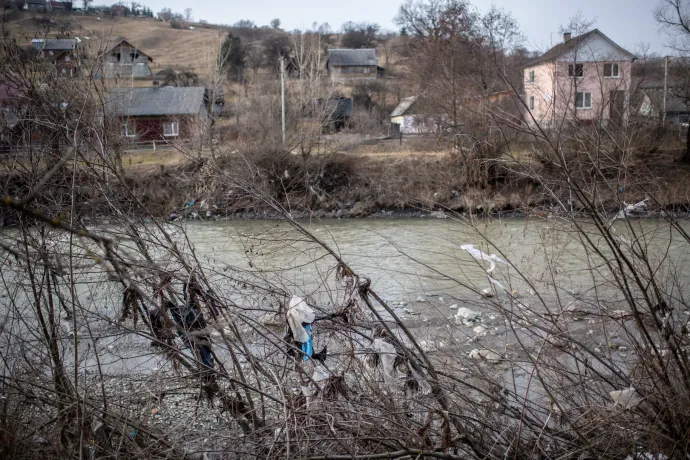
There is no precise information on the number of landfills in Transcarpathia. A large number of them are illegal, with nearly 200 out of 413 settlements without a garbage truck – Gergely Hankó, Project Manager of the Tisza PET Cup and Executive Director of the Association of Environmental Service Providers and Producers said at a press event where the CALL-Action international waste prevention programme, a joint project of PET Cup and Diageo was presented.
The two-year project, which started this year, aims to carry out waste management and river cleaning operations in Transcarpathia, which should reduce the amount of waste ending up in the Tisza river which continues into Hungary. They will support local entrepreneurs, volunteers and NGOs who have already done a lot to prevent the pollution of the river. This is important because there is currently no system in place – on a community level or individually – in Ukraine’s Transcarpathian region for processing rubbish, which is why vast amounts of waste end up in the Tisza. As a result of this, much of this waste flows into Hungary on the river. Telex has previously published a documentary about the severity of the problem and the difficulties of solving it, which you may view here with English subtitles.
Not much has been done until now
The CALL-Action project has now brought together the expertise of PET Cup, which has been organizing volunteer projects to clean the Tisza for years, and the financial support of Diageo, one of the world's leading alcoholic beverage manufacturers and distributors.
The Directorate of the Upper Tisza Region has also joined the project. Section engineer Gábor Molnár said at Wednesday's press event that he had never thought anyone would be interested in the bottles floating down the Tisza.
“The idea of what should be done was there ten years ago, but no one in the country did anything about it”.
Gergely Hankó – quoted at the beginning of this article – is among the few who have been taking the problem seriously for quite some time. He was the only one at a waste management expo held in Kyiv in 2018 who stood up and spoke about the vast amounts of waste polluting the Tisza river annually. This project is his dream come true, as they are finally able to provide locals with the means and the infrastructure for waste management.
The war has made local waste collection even more difficult
Other than the Hungarian supporters of the project, we also spoke with two Ukrainians who are helping with the implementation of the project. They commented that neither the past two years of the pandemic nor the ongoing Russian-Ukrainian war have been good for waste management.
“Transcarpathia is housing more than 500 000 refugees, which is reflected in the amount of trash, and we are definitely feeling the effects of this”
– Viktor Buchinsky said in the video message he sent from Berehove.
They have organized a selective collection of household waste, since many people throw their rubbish in the Tisza because waste collection isn’t organized in Transcarpathia. He added that the number of men in the region has decreased due to the war, and it is harder for the women to take the waste to their collection sites, so now they have to pick up the waste directly from the populace, which makes their work harder. They were, however, able to purchase a forklift when the project started, so now they no longer have to load the trash by hand. At the end of his video message, he added with a smile:
„It seems that not only will our rubbish be in Europe, but so will we”.
Ruslan Shvarts came to Budapest from the Ukrainian town of Uzhgorod. He echoed his colleague's words, saying that finding workers has been a struggle, given that a lot of men have left the country due to the war. He currently only has four employees. He said:
„I truly hope that we will get to see the time when our Hungarian friends will come to us simply for visits and not so we could work together.”
If you want to be sure not to miss any quick, accurate and impartial news about Hungary, subscribe to the Telex English newsletter!
The translation of this article was made possible by our cooperation with the Heinrich Böll Foundation.